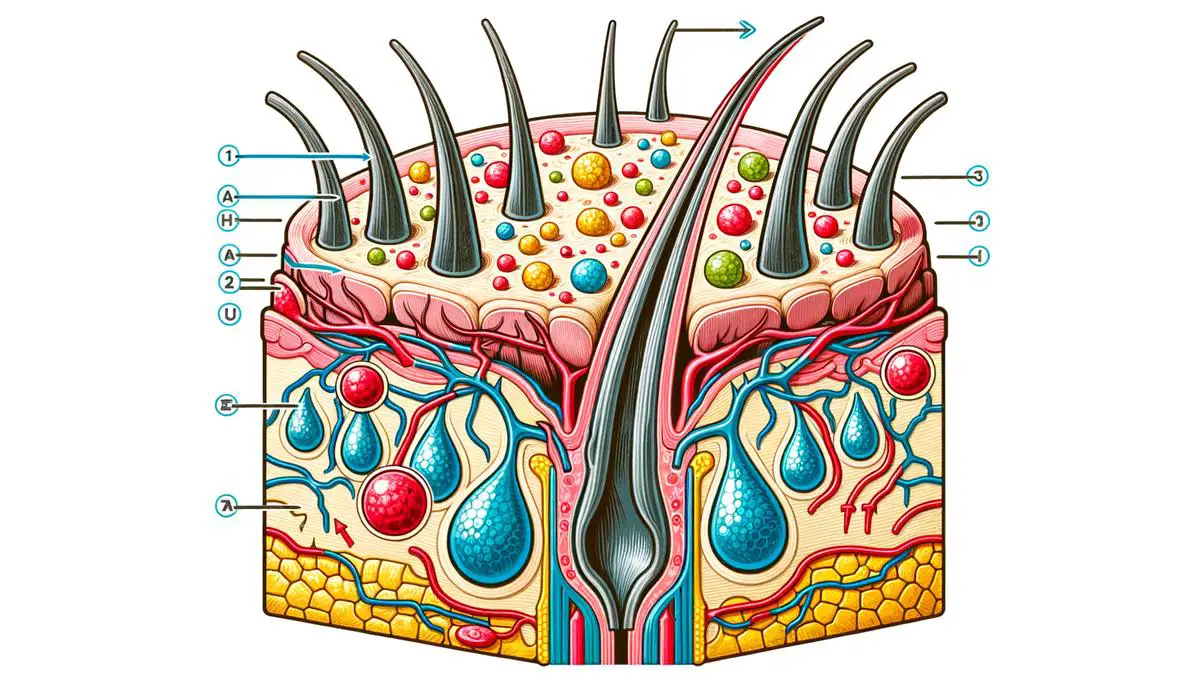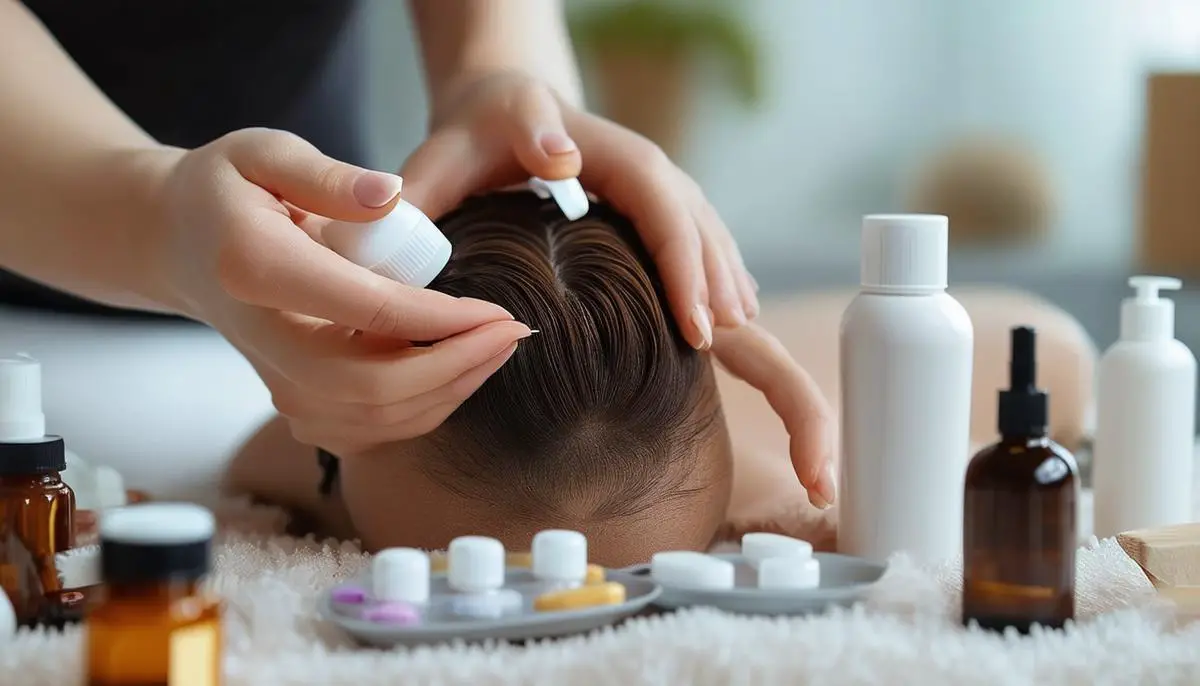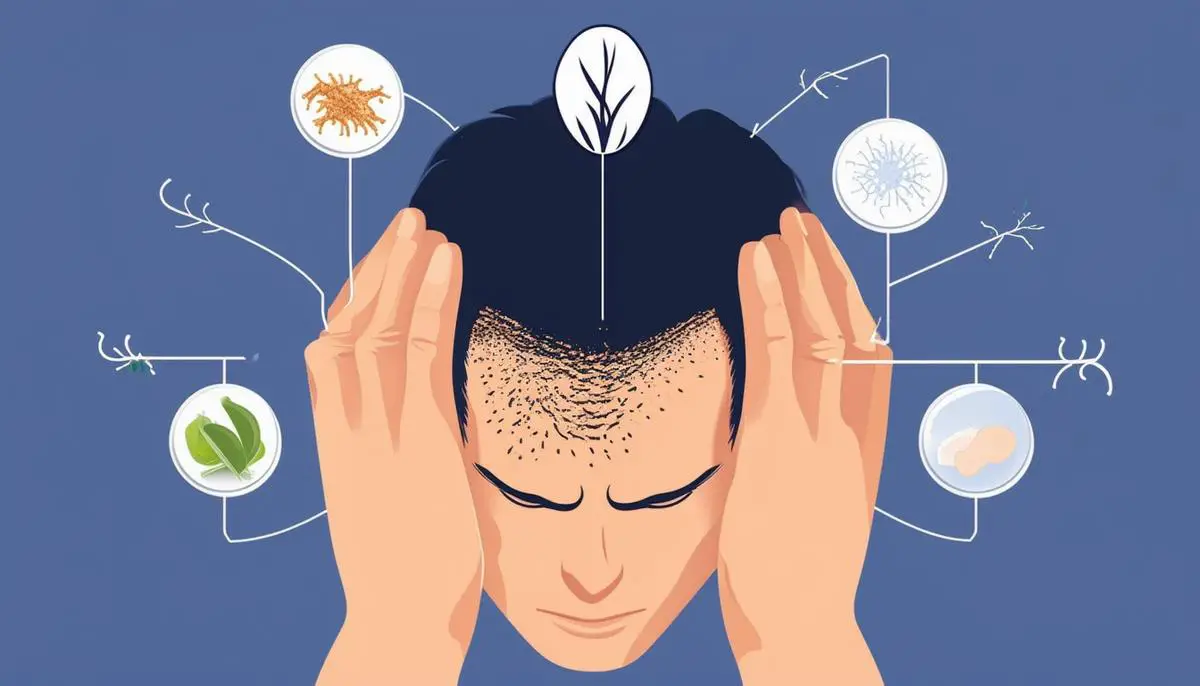tress can disrupt many aspects of our well-being, including scalp health. From dandruff to hair loss, stress can manifest in ways that affect not just how we feel but also how we look. Understanding the connection between stress and scalp health is essential for managing these issues effectively.
Effect of Stress on Scalp Health
Stress has a way of affecting our scalp health in surprising ways. When our bodies experience stress, they release cortisol, which can create problems for our scalp. This hormone can cause inflammation, disrupt the scalp’s microbiome, and throw off the balance of bacteria and fungi on your scalp. The result? Conditions like dandruff and seborrheic dermatitis, which bring flaking, redness, and itching.
Stress also messes with your hair growth cycle. Normally, hair follows a rhythm of growing, resting, and shedding. Stress can push more hair follicles into the resting phase too quickly, leading to a condition called telogen effluvium. This is why you might notice more hair in your brush or shower drain a few months after a particularly stressful time.
Scientific studies have shown a clear link between stress-induced hormone changes and hair growth disruptions. Stress can also aggravate pre-existing conditions like psoriasis, causing painful flare-ups on the scalp.
Tips for Managing Stress-Related Scalp Issues:
- Use gentle hair care routines and shampoos with ingredients like salicylic acid or zinc pyrithione
- Try scalp massages to improve blood flow and reduce tension
- Incorporate mindfulness practices
- Maintain a balanced diet rich in omega-3 fatty acids
- Stay hydrated
- Get enough sleep
Protecting your scalp from the sun and avoiding harsh chemicals in hair products can also help prevent further damage. By keeping an eye on stress levels and addressing scalp issues promptly, you can better manage your scalp health.

Common Stress-Related Scalp Conditions
Stress can trigger or worsen several common scalp conditions:
- Dandruff: Those familiar white flakes can be exacerbated by stress-induced changes in oil production. The yeast Malassezia thrives in this oily environment, leading to flaking and itching.
- Seborrheic dermatitis: A step up from dandruff, this condition causes flaky, scaly patches and can become more aggressive during stressful periods. It often affects areas rich in oil glands like the scalp, face, and chest.
- Telogen effluvium: This condition causes a sudden increase in hair shedding. After severe stress, hair follicles can prematurely enter the resting phase, leading to noticeable hair loss a few months later.
- Alopecia areata: An autoimmune condition causing patchy hair loss. Stress can trigger or worsen attacks on hair follicles, leading to smooth, round bald spots.
- Scalp psoriasis: Another autoimmune disorder where stress is a known trigger. It causes thick, scaly plaques on the skin, including the scalp, and can be itchy and painful.
- Eczema (atopic dermatitis): Characterized by red, itchy patches, eczema can worsen during stressful times. Stress reduces the skin’s ability to retain moisture, leading to dryness and cracking.
Recognizing these conditions allows for more effective management. Regular use of medicated shampoos, stress reduction techniques, and overall health maintenance can help mitigate the impact of these scalp issues.
Treatment and Management Strategies
To treat and manage stress-related scalp conditions effectively, consider the following strategies:
- Choose the right products: Look for shampoos containing salicylic acid or zinc pyrithione to control dandruff and seborrheic dermatitis. For stubborn psoriasis or severe dandruff, coal tar shampoos can be effective. Follow up with a gentle, fragrance-free conditioner.
- Use topical solutions: Over-the-counter corticosteroid creams can help reduce inflammation and itching. For severe cases, consult a dermatologist for prescription-strength treatments.
- Incorporate stress management techniques: Practice mindfulness through yoga, meditation, or deep breathing exercises. These can help lower cortisol levels and control inflammation.
- Exercise regularly: Physical activity increases blood flow to the scalp and releases endorphins, which can help combat stress.
- Maintain a balanced diet: Focus on foods rich in omega-3 fatty acids, vitamins, and minerals. Stay hydrated to keep your skin and scalp moisturized.
- Try scalp massages: Gently massaging your scalp can increase blood circulation and be relaxing. Consider using a nourishing oil like coconut or jojoba during the massage.
- Seek professional help: For severe or persistent issues, consult a dermatologist. They can provide personalized advice and treatment options, including light therapy for psoriasis or oral medications if needed.
Remember, managing stress-related scalp issues requires a holistic approach that includes caring for your overall health and well-being. Combining these strategies can help you achieve better scalp health and manage stress more effectively.

Preventive Measures and Healthy Lifestyle
To stay ahead of stress-related scalp issues, focus on these preventive measures and lifestyle changes:
| Preventive Measure | Description |
|---|---|
| Regular exercise | Boost circulation to your hair follicles through physical activity. Choose activities you enjoy, whether it’s running, yoga, or dancing. |
| Stress management | Incorporate relaxation techniques like yoga, meditation, or deep breathing into your daily routine. Even short sessions can help lower cortisol levels and benefit your scalp. |
| Balanced diet | Eat foods rich in omega-3 fatty acids, vitamins, and antioxidants. Include plenty of fruits, vegetables, lean proteins, and whole grains. Stay hydrated by drinking enough water throughout the day. |
| Consistent hair care | Develop a regular routine using gentle products suited to your scalp type. For dandruff or seborrheic dermatitis, use medicated shampoos with ingredients like ketoconazole or coal tar. Don’t forget to condition, especially if using drying medicated shampoos. |
| Quality sleep | Aim for 7-9 hours of restful sleep each night. Create a calming bedtime routine to help you wind down and promote better sleep quality. |
| Mindfulness | Practice mindfulness through meditation, deep breathing, or taking moments to reflect and relax each day. |
| Personal care | Indulge in activities like warm baths with essential oils or DIY scalp massages to relieve stress and care for your scalp. |
| Set boundaries | Learn to say no when necessary and give yourself permission to rest and recharge. |
By incorporating these preventive measures and lifestyle adjustments into your daily routine, you’re not just caring for your scalp but fostering overall well-being. This holistic approach intertwines the health of your body and mind, keeping your scalp happy and healthy.

When you notice signs like increased hair shedding or an itchy scalp, it’s a signal to check on your stress levels. By adopting gentle hair care routines, incorporating mindfulness practices, and making healthy lifestyle choices, you can protect your scalp from the adverse effects of stress. Remember, taking care of your mental well-being is just as important as caring for your physical health.




